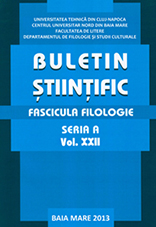Platon, Gorgias – De la concepte etice la o etică a întrebării
PLATON, GORGIAS – FROM ETHICAL CONCEPTS TO THE ETHICS OF QUESTIONING
Author(s): Marina-Oltea PăunescuSubject(s): Cultural Essay, Political Essay, Societal Essay
Published by: Editura U. T. Press
Keywords: ethical concepts; dialogue; argumentative semantics; question;
Summary/Abstract: Like most of the Platonian dialogues Gorgias has, in addition to the inherent argumentative dimension, a definite semantic dimension, as well. Hence, the dialogue starts with a question that apparently is outside of the ethical area, but which borrows the formal structure of the famous Socratic question: “What is rhetoric?” For Socrates knowing that actually means to know its essence, to master it conceptually. The discussion is about the theoretical knowledge, the only genuine knowledge. Unlike Socrates, his interlocutors are moving more in the area of practical knowledge, of knowing how. At this point, the semantic stake of the dialogue is supported by the intervention of the ethical perspective: how to act by using what I know? In Socrates' vision the moral action presupposes knowing some clear, distinct, stable and especially non-contradictory ethical concepts. Since one of the topics of the dialogue is the very interpretation of the ethical concepts - what means "fair" and "unfair" or "good" and "bad" - can the argumentative semantics provide a grid of pertinent readings for these concepts? If yes, what could be the role of questions in the overall economics of the dialogue? In the opinion of the author, the Socratic maieutics could be seen as propaedeutics whose ultimate purpose is to correctly position the interlocutors in the ethical space.
Journal: Buletin Stiintific, seria A, Fascicula Filologie
- Issue Year: XXII/2013
- Issue No: 1
- Page Range: 333-347
- Page Count: 15
- Language: Romanian

